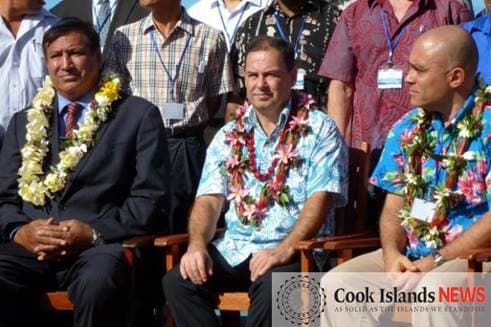Activists "hijacked" mining meeting

Source: Cook Islands News
Representative Tom Marsters (front left) sits alongside Finance Minister Mark Brown (middle) and Financial Secretary Richard Neves on the opening day of the seabed minerals forum. 14051305
A seabed minerals update meeting held for the public this week was disrupted by certain individuals who “hijacked” the event, says Seabed Minerals Commissioner Paul Lynch.
Organised by the Cook Islands Seabed Minerals Authority (SBMA), the public session was scheduled to run from 6pm to 7pm at the Rarotongan Beach Resort on Wednesday - but ended up finishing an hour late.
A group of panellists were on hand to make presentations about deep sea minerals and then respond to questions from the audience.
Lynch said a few loud individuals ended up dominating proceedings and preventing others from asking questions.
“It was hijacked by people who didn’t want to listen or ask questions of our panel. With locals, if someone’s making a big noise they’ll go back into their shell.”
The public meeting came in the middle of a major regional workshop on deep sea minerals - attended by dozens of overseas representatives – which was held in Rarotonga this week.
Lynch said the main purpose of this workshop – and accordingly, the public meeting - was to look specifically at the financial aspects of deep sea minerals.
Those that “hijacked” the meeting had no interest in talking about these issues but focused purely on environmental concerns, he said.
Jacqui Evans, Marine Park Project Manager for environmental group Te Ipukarea Society (TIS), said she found the meeting “awkward” and “repetitive”.
“It was long-winded. They should have given an opportunity for panellists to say something and they didn’t provide a space for us to ask questions. They kept trying to steer the discussion away from the environment.”
She said she was more interested in putting questions to the SBMA than the panellists, but was prevented from doing so.
“They just kept telling us: ‘The panel are specialists and are only here for a short time, you need to ask them questions’.”
One positive was the presentation from Alison Swadling, an Environment Advisor with the Deep Sea Minerals Project, Evans said.
“She said we need to understand the impacts first before we decide whether to mine of not, because so often the Government has taken it for granted that we will mine without knowing what the impacts will be.”
Criticism of the meeting also came from visiting environmental activist Sue Arnold, head of Australians for Animals International.
“Most of the evening was taken up with long and repetitive sermons that ate away question time. It must have been the only expert panel that didn’t receive more than one question as Paul Lynch kept trying to change the focus to financial issues when the environment, cultural, and legal issues are paramount.”
Arnold said the meeting failed to give Cook Islanders an opportunity to address “the very serious concerns” associated with deep sea mining.
Lynch said there will be plenty of opportunity for members of the public to learn more about deep sea minerals and ask questions.
SBMA will in time be holding other meetings in community halls to talk about these issues, he said.
